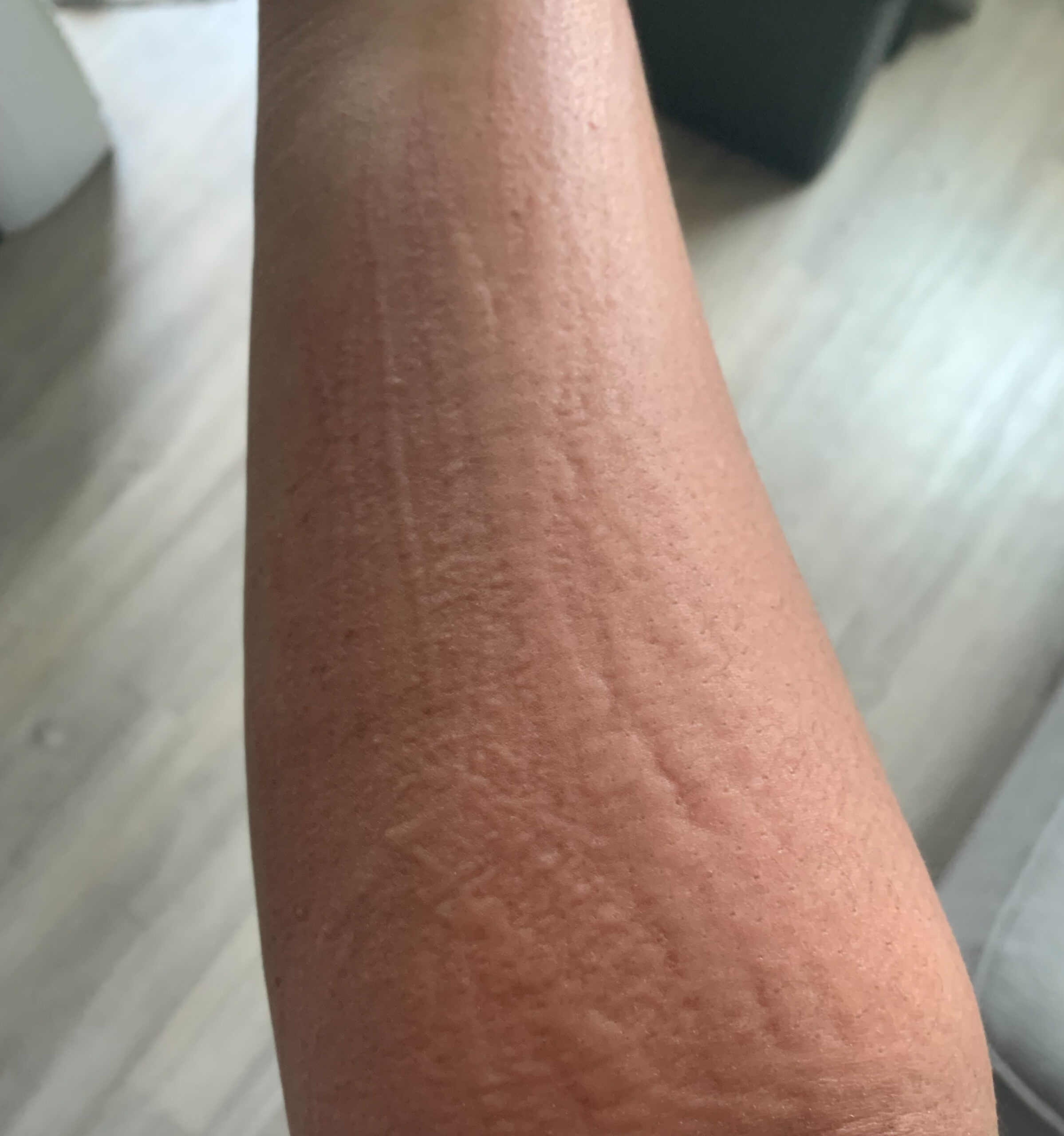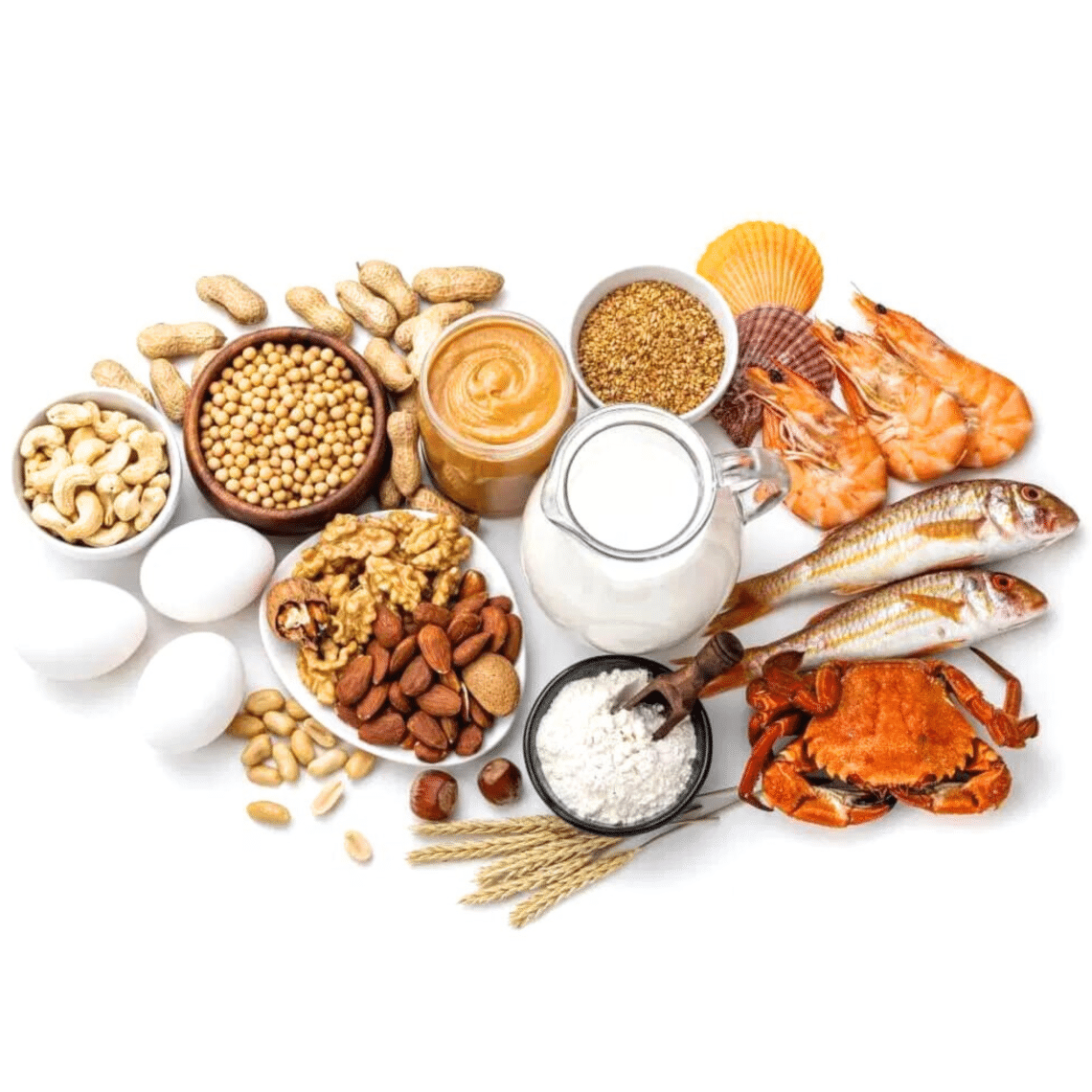What causes histamine intolerance can be a tricky question. It can be difficult to diagnose and treat since so many practitioners are still unfamiliar with the condition.
In this article, I’ll discuss what histamine intolerance is, how it develops and what you can do to treat it.
When you make a purchase through one of the links included in this article, I may earn a small commission. Learn more here›
My Experience
In 2017 I started experiencing chronic hives. I would have episodes of itchiness that lasted for hours. There were nights when I could not get to sleep because my skin was so inflamed. I was miserable and I couldn’t figure out what was going on.
I have always had sensitive skin, so I initially thought it was a product I was using. But, after further simplifying an already minimalist skincare routine. I was able to determine that the skincare products were not the problem. It was the food I was eating that was causing all the issues.
I noticed that anytime I had a flare, it would start during or after a meal, snack or drink. I got to the point where I could not eat without taking an antihistamine. At first, I thought I had somehow become allergic to all foods. But I began to notice it was certain foods like coffee, nuts, and corn that caused major flare-ups. What’s odd is that I never had any food allergies prior to this, so needless to say I was freaking out not knowing what to do.
I eliminated my trigger foods, reduced my stress (stress can exacerbate hives) and stayed fully stocked with antihistamines. After several months, my symptoms disappeared. There was no gradual tapering off, my hives just completely went away. I slowly reintroduced my trigger foods after a few weeks of remission and had no major issues. I was thankful because I was in misery for so many months, but a bit confused since there was no clear explanation as to why it happened and why it stopped.

Histamine Intolerance + MCAS
Fast forward a year later, the hives returned with a vengeance. Not only was I itchy all over, I was now experiencing new symptoms like sneezing, watery eyes and a runny nose. I was having daily full-blown allergic reactions to the same trigger foods in addition to some new foods. I was also experiencing GI issues, like stomach pain and bloating anytime I would eat these foods.
Things got so bad that I ended up seeing three allergists and two gastroenterologists all in the same month. But, the doctor’s visits were a waste of time. The allergists suggested I take an antihistamine, (which I was already doing) and see a gastroenterologist. The gastroenterologists suggested I see an allergist (which I had already done) and recommended I get a colonoscopy!
I was defeated. It was so frustrating trying to get answers from medical professionals, only to be met with canned medical advice and “perhaps it’s all in your head” vibes.
So, I took a break from finding a new doctor and spent months researching my symptoms. I tried various elimination diets, like dairy-free, sugar-free and a low carb diet and none of them yielded any long-term results. I then tried a low histamine diet and felt relief after only two days. I was able to determine that I had somehow developed histamine intolerance (HIT) and high histamine foods (such as corn, coffee, and some nuts) were triggering a histamine response in my body. By lowering my histamine levels, I experienced less hives and less inflammation. The diet wasn’t a cure, but my symptoms improved quite a bit. If you want to know more about the foods I ate on a low histamine diet read more about it here.
Do Your Research
Based on all the research I had done, I was pretty sure I had Mast Cell Activation Syndrome (MCAS). My sudden allergic reactions to food I had never previously been allergic to was spot on for MCAS. As well as the GI issues I was experiencing when eating trigger foods.
Since I was tired of being dismissed by allergists. I decided to find an immunologist who specialized in MCAS. Immunologists tend to focus more on complex immune disorders. Whereas allergists tend to focus on treating skin and respiratory allergies.
It took several months (nine to be exact) to get in with my current doctor, as she is one of the top MCAS doctor’s in the country. But when I finally did, it was a relief to talk to someone who knew exactly what I was experiencing. She ordered several tests which confirmed what I suspected, I had Mast Cell Activation Syndrome.
Finding the right practitioner is key to getting the proper diagnosis and treatment. But don’t sleep on doing your own research. The internet was the most reliable tool I had when trying to get to the bottom of my symptoms.
So by the time I saw the doctor, I already knew a lot of the information she shared with me about histamine intolerance and MCAS. And I had a headstart on most of the things she had recommended for treatment.
I am not a medical professional and this is not medical advice. Please seek out a medical professional for proper diagnosis and treatment.
What Is Histamine Intolerance?
Histamine intolerance is a disorder in which the body cannot properly metabolize dietary histamine. A person can develop allergy-like symptoms by ingesting histamine-rich foods, drinks, and supplements. It can develop without warning and cause an array of symptoms, some of which include hives, intense itching, sneezing, coughing, watery eyes as well as gastrointestinal discomfort.
The interesting thing about histamine intolerance is that it can be unpredictable. The food that caused you no issues yesterday, could trigger an allergic reaction the following day. That’s because histamine intolerance is cumulative. For example, think of your body as a cup and histamine as the liquid that goes into the cup. Every time you eat, your cup is filling up with liquid/histamine. Once the cup is full, the overflow of histamine causes symptoms to occur.
What Causes Histamine Intolerance?
Although there are varying theories on how histamine intolerance develops. There is no concrete answer as to why. Researchers have identified a few possible causes that may trigger HIT.
VITAMIN D DEFICIENCY
There are several research studies that suggest a link between allergic reactions and low vitamin D levels. The studies suggest that vitamin D regulates the immune system and supports mast cell stabilization. Research suggests that those with Vitamin D deficiency are more likely to be at risk for severe allergy disorders due to mast cell dysfunction causing the release of histamine and other inflammatory responses.
Get your vitamin D levels checked if you suspect you have histamine intolerance.
DAO DEFICIENCY
There is very little known about what causes histamine intolerance. However, a common theme among several studies points to a deficiency of the diamine oxidase enzyme, commonly known as DAO enzyme. The DAO enzyme is responsible for metabolizing histamine that comes from food. When there is a deficiency of DAO it causes a buildup of histamine. As a result, the body responds by releasing the excess histamine.
GUT ISSUES
Those with gut disorders like IBS, SIBO or Leaky Gut Syndrome are more prone to have histamine intolerance due to their association with DAO enzyme dysfunction. Make an appointment with your doctor or practitioner if you suspect you may have one of these conditions.
To learn more about how histamine intolerance is related to gut health. Check out this study on how histamine intolerance originates in the gut.
Histamine Intolerance Symptoms
1.) Development of Hives or Wheals During or After Food Consumption
Experiencing a sudden allergic reaction to foods you have previously been able to eat with no issues.
2.) Unexplained Itching, Inflammation, or Flushed Skin
Itching, inflammation, or flushed skin can be a sign of histamine intolerance. Particularly, if your symptoms occur during or after eating or drinking. An allergy-like reaction can occur when histamine levels are elevated from consuming histamine-rich foods.
3.) Coughing, Sneezing, Watery Eyes, or Post Nasal After Meals
Similar to seasonal allergy symptoms, coughing, sneezing, and watery eyes can all be signs of histamine intolerance. If your symptoms occur during or after meals, it may have histamine intolerance.
4.) Bloating, Upset Stomach, or Other Gastrointestinal Issues
Although very common, Itching and hives aren’t always a symptom of histamine intolerance. Gas, bloating, or other gastrointestinal issues can be a sign that you have histamine intolerance.
Histamine Intolerance Treatment
I am not a medical professional and this is not medical advice. Please seek out a medical professional for proper diagnosis and treatment.
Histamine intolerance can be difficult to treat. Figuring out what the underlining cause of your histamine intolerance is key. Treatment for HIT should be individualized based on your own symptoms. Talk to a healthcare professional about what may be right for you.
1.) Dietary Intervention
Start by identifying your trigger foods. Knowing exactly what causes flare-ups can be helpful to the process.
2.) Consider A Low-Histamine Diet
Once you’ve identified your trigger foods, consider starting a low-histamine diet. You can use the list I created for myself here or find one on the internet. The low-histamine food lists you’ll find on the internet will vary. My list is fairly dialed in as I tend to be more reactive to certain foods that would otherwise be considered low histamine. I made my own list because many of the lists contain foods that trigger my symptoms. Since everyone’s reaction to certain foods can be different, just be aware that foods that appear on some lists can include foods that may actually cause a flare.
3.) Consider Antihistamines
Many practitioners suggest taking an H1 inhibitor, also known as an antihistamine as the first line of defense. My initial regimen included fexofenadine hydrochloride daily, along with a low-histamine diet. Although I have tried others, this is the one and only brand I have not had any issues with, and it’s worked well for me for years. Since my symptoms have improved, I now can go several days without taking an antihistamine. But be sure to talk to your doctor about which antihistamine is best for you and what the proper dosage should be.
4.) Address Any GI Disorders
Get treatment for GI disorders if applicable. Although listed as the fourth step, this is truly the most important step. Many times, histamine intolerance is caused by an underlying gut issue such as Leaky Gut, IBS or SIBO. Symptoms can decrease or completely disappear once your gut problem is resolved.
See your naturopath, gastroenterologist or integrative medicine practitioner for guidance.
Having trouble finding a practitioner? Start with your medical insurance provider as some insurances will cover naturopathic and integrative medicine services.
Do you have histamine intolerance? What’ been your experience? Share your store in the comments.


4 Comments
Vivian Brandon
August 3, 2024 atI have always been allergic to many things but very few that i couldn’t avoid to keep my symptoms at bay. In the last 10yrs they have been unpredictable and more frequent and to practical everything becomes a hive a bump itchy welts or rash. Not everywhere in certain places. Might you i stopped eatting things with high fructose, corn syrup corn not organic but other kinds no process food only home made from whole foods.even ice tea made me react.
First the nickel allergy made me stop wearing jewelry made my neck feel like little knives and darken the skin. Then arm boils and darkening of underarms. But was isolated to only certain areas . I addressed with my dr who prescribed a strong anti bateceral ointment. It gives me some relief. Mind you i have been tested for everything under the sun. But have to be diligent or it gets worst. No deodorant no scented anything including detergent.
Then my mouth throat and ears would tinkle after eatting my favorite fruits. My dr addressed and advised that i am so hyper sensitive that my body is seeing the pollen in fruit as a trigger to my allergies.
Throughout my life i have suffered with external triggers but its like my body reacts to everything. The part where you speak about the cup of histamines overflowing resounadated with me. My white cut is so high from fighting off everything and my bidy stop producing b12 which i now inject twice a week. But i feel like my options are becoming smaller and smaller.
I will discuss this with my dr about your experiences and things to perhaps look for. Thanks for speaking in plain English and letting me know i am not alone i found you with goggle ai after taking a picture of my current reaction and found you. Thanks again.
Nicole
August 5, 2024 atHi Vivian! Thanks for your comment. You are definitely not alone. It can be difficult to manage multiple symptoms. Especially if you’re not sure what’s causing them. Keep searching for the answers you need. You will find them. It took a lot of research, finding the right practitioner and a lot of trial and error for me to get to where I am now with managing my symptoms. It’s a process. But it’s worth it to feel better. Good luck, you got this!
Lani
January 16, 2025 atWow! I am so happy to have found your page and see you speaking about mcas! I am 32 years old and had a diagnostic test done last month due to some odd issues. My biopsy came back as Mastocytic Enterocolitis which I’ve read is essentially the same thing as MCAS. I’ve been searching the internet to try to figure out this new lifestyle that I will have to take on. Thankful to have this page as a resource for different types of food and products. The only trigger I’ve experienced hives and gi issues with are Fritos and coffee. I’m sure there are others that I will figure out as I go and have that “ah ha” moment. I’d love to know if you follow any other bloggers or accounts with similar experiences.
Nicole
February 4, 2025 atHi Lani! Thanks for your message. I am so glad you have found my website helpful. When I was diagnosed with MCAS several years ago, I found that the SIGHI and Royal Prince Hospital websites were the most helpful in providing guidance on what to eat. But it was a patchwork of piecing together information from my doctors and naturopaths who specialized in MCAS, scholarly articles and research studies that helped me understand what I was experiencing. But, because the source of MCAS and histamine intolerance is so varied, under studied and nuanced, finding help can be difficult and the resources continue to be limited. Which is why I started writing about my experience. I am currently working on a resource guide and additional articles on MCAS and histamine intolerance compiling what I’ve learned thus far in the hope it helps others navigate their own diagnosis.